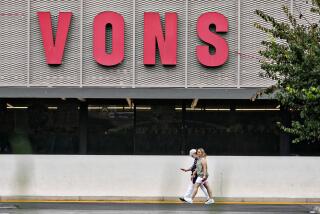Wal-Mart Still a Market Issue
Once again, the grocery chains are invoking the boogeyman of Wal-Mart Stores Inc. in an attempt to force concessions upon their employees. In “A Question of Economics” [Oct. 13], a Wall Street analyst blithely says that “you have to make a violent change to get a chance at surviving.”
This violent change is the transformation of a job that once allowed one to lead a middle-class lifestyle (owning a home, raising a family, etc.) to one that pays below the poverty line.
One might say, “Why should I care, I don’t work in a market. And besides, I don’t want to pay more for groceries.”
No one wants to pay more, but it is in our interests as a society to support this strike. I don’t just mean in a moral sense.
If the markets succeed in their Wal-Martization efforts, this will spread to other states and other businesses. The end result is that thousands of people will be earning much less.
We have an economy that depends on consumption. These people will no longer be able to buy homes, cars and other goods. That sends a ripple effect through our economy that will be felt widely.
Karen Dauphin
Agoura Hills
*
I found it quite amusing that the three supermarket store chains -- Kroger Co., Albertsons Inc. and Safeway Inc. -- are trying to compete with the likes of Wal-Mart by attempting to reduce wages and benefits to employees.
Let me see if I have the facts straight. Kroger posted net income of $3.117 billion for the last three fiscal years. It doesn’t sound like Kroger is in too much trouble.
Albertsons’ earnings are down because of poor management decisions.
Likewise Safeway, after posting gains of $1.1 billion in 2000 and $1.3 billion in 2001, has now lost $828 million, again because of poor management decisions.
Certainly, business must take calculated risks in order to expand and thrive, but the average shareholder would be better served if Wall Street insisted on better and more accountable management to provide this leadership, and less on reducing the wages and benefits of employees.
It would be ludicrous to imply that reducing workers’ pay and benefits could compensate for the much more severe and consequential outcomes of poor management.
“Most union supermarket workers are clerks who now earn up to $17.90 an hour.” How much does top management make at Albertsons and Safeway?
David M. Romero
Acton
*
In virtually every article, Wal-Mart is listed as the impending threat to the chains, and hence a major cause in the makeup of the gap between employer offers and employee demands.
If in fact one of the main issues is the competitive threat posed by Wal-Mart, and Wal-Mart pays less than $9 an hour and non-comparable benefits, why isn’t the union turning over every rock to unionize the place? Or if they are, why are they not yet successful?
David O’Shea
Costa Mesa
*
I really enjoyed the scurrilous comments from Mark Husson of Merrill Lynch. He’s quoted as saying that employers have “to make a violent change to get a chance at surviving.” What he means, of course, is that employees have to be given wage cuts, slashed health benefits and pink slips.
Mr. Husson sits on Wall Street, in his suit and tie, in no danger of having his livelihood disturbed, a safe distance away. All he’s interested in is making some more quick bucks for investors and himself.
Philip Brimble
Mar Vista
More to Read
Inside the business of entertainment
The Wide Shot brings you news, analysis and insights on everything from streaming wars to production — and what it all means for the future.
You may occasionally receive promotional content from the Los Angeles Times.










